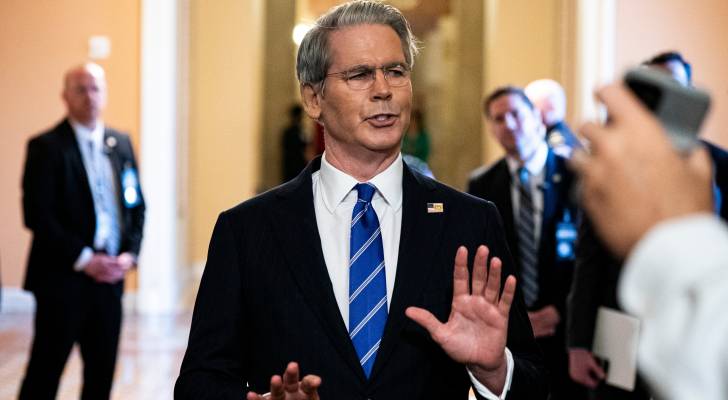Getty Images
Moneywise and Yahoo Finance LLC may earn commission or revenue through links in the content below.
Housing affordability has become one of the most pressing issues in America — and the Trump administration is weighing extraordinary measures to address it, according to Treasury Secretary Scott Bessent.
“We may declare a national housing emergency in the fall,” Bessent told the Washington Examiner in a recent interview [1].
He noted that interest rate cuts from the Federal Reserve could help ease post-pandemic housing prices, but stressed that the administration is also exploring its own options to lower expenses and boost supply. While Bessent stopped short of outlining specific steps, he said officials are studying ways to standardize local building and zoning codes, reduce closing costs and may even consider tariff exemptions on certain construction materials.
“We’re trying to figure out what we can do and we don’t want to step into the business of states, counties and municipal governments,” Bessent said. “I think everything is on the table.”
The fact that the White House is even weighing a national emergency underscores the severity of the crisis. Zillow estimates the country faces a shortage of 4.7 million homes [2] — a gap that has kept prices stubbornly high. Paired with elevated interest rates, the lack of supply has made homeownership increasingly out of reach.
Realtor.com calculates that a typical household would need to earn $118,530 annually to afford a median-priced home of $402,500 — more than 52% above today’s median household income of roughly $77,700.
Not everyone, however, is convinced that Trump’s team will ease the crunch.
“Unfortunately, everything Trump is doing that affects housing availability will make the emergency worse,” Nobel Prize-winning economist Paul Krugman wrote in a blog post [4], pointing out that Trump has already declared nine national emergencies despite being in office for less than eight months.
“As far as I can tell, so far all of Trump’s claims about emergency have been false excuses for power grabs,” Krugman added.
Still, Krugman conceded that Bessent is right on one point: “We do, in fact, have a housing emergency,” and “the popular perception that housing has become unaffordable is grounded in reality.”
Story Continues
The good news? While buying a home is increasingly difficult, you no longer need to purchase a property outright to invest in real estate.
Crowdfunding platforms like Arrived have made it easier than ever for everyday investors to gain exposure to America’s real estate market.
Backed by world class investors like Jeff Bezos, Arrived allows you to invest in shares of rental homes with as little as $100, all without the hassle of mowing lawns, fixing leaky faucets or handling difficult tenants.
The process is simple: browse a curated selection of homes that have been vetted for their appreciation and income potential. Once you find a property you like, select the number of shares you’d like to purchase and then sit back as you start receiving any positive rental income distributions from your investment.
Read more: Rich, young Americans are ditching stocks — here are the alternative assets they’re banking on instead
As home prices have risen over the years, Americans have built substantial wealth through homeownership, but the $35 trillion U.S. home equity market has historically been dominated by large institutions.
Homeshares is changing the game by allowing accredited investors to gain direct exposure to hundreds of owner-occupied homes in top U.S. cities through their U.S. Home Equity Fund — without the headaches of buying, owning, or managing property.
With risk-adjusted target returns ranging from 14% to 17%, this approach provides an effective, hands-off way to invest in owner-occupied residential properties across regional markets.
If you’ve ever been a landlord, you know how important it is to have reliable tenants.
How do grocery stores sound?
That’s where First National Realty Partners (FNRP) comes in. The platform allows accredited investors to diversify their portfolio through grocery-anchored commercial properties without taking on the responsibilities of being a landlord.
With a minimum investment of $50,000, investors can own a share of properties leased by national brands like Whole Foods, Kroger and Walmart, which provide essential goods to their communities. Thanks to Triple Net (NNN) leases, accredited investors are able to invest in these properties without worrying about tenant costs cutting into their potential returns.
Simply answer a few questions — including how much you would like to invest — to start browsing their full list of available properties.
Stay in the know. Join 200,000+ readers and get the best of Moneywise sent straight to your inbox every week for free. Subscribe now.
At Moneywise, we consider it our responsibility to produce accurate and trustworthy content people can rely on to inform their financial decisions. We rely on vetted sources such as government data, financial records and expert interviews and highlight credible third-party reporting when appropriate.
We are committed to transparency and accountability, correcting errors openly and adhering to the best practices of the journalism industry. For more details, see our editorial ethics and guidelines.
[1]. Washington Examiner. “Bessent predicts ‘big economic pickup in 2026’ and possible national housing emergency declaration this fall”
[2]. Zillow. “The National Housing Deficit Grew by 159,000 Homes in 2023, Reaching 4.7 Million”
[3]. Realtor. “How Much You Need To Earn in Every State To Buy a Home”
[4]. PaulKrugman.Substack.com. “Yes, America Has a Housing Emergency”
This article provides information only and should not be construed as advice. It is provided without warranty of any kind.
